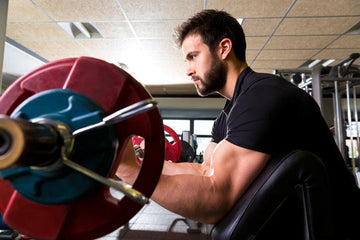

Eat to Recover: Carb Science for Muscle Recuperation
Table of Contents
Eat to Recover: Carb Science for Muscle Recuperation
By: Robbie Durand
Since most bodybuilders and athletes consume plenty of protein, the topic of interest that many bodybuilders have is do carbohydrates affect muscle recovery and recuperation. It is accepted that post-exercise nutrition should include both carbohydrates and protein yet the ratio has yet to be determined. Glycogen synthesis has been reported to play a role in muscle recuperation and also muscle growth. Low carbohydrate diets can impair strength training and consuming adequate carbohydrate before training can reduce glycogen depletion and increase performance in the gym.
In a previous study of athletes taking in the same amount of protein (1.6 g/kg) during weight loss, performance decrements and lean muscle mass losses were avoided when adequate carbohydrate was maintained and dietary fat was lowered. Another study found that a reducing dietary fat while on a reduced calorie diet while maintaining adequate carbohydrate intake and increasing dietary protein to 2.3 g/kg maintained performance and almost eliminated muscle mass losses in resistance trained subjects. There are two phases of glycogen synthesis: an insulin independent phase and an insulin dependent phase.

Glycogen synthesis has been reported to play a role in muscle recovery and also muscle growth. There are two phases of glycogen synthesis: an insulin independent phase and an insulin dependent phase. The first stage as it describes does not depend on insulin for glycogen synthesis and occurs when glycogen levels are low. The second recovery period was defined as the insulin-dependent phase of postexercise glycogen synthesis which is ~10–30% lower than repletion rates observed during the initial, insulin-independent phase. Interestingly, previous research has reported that reported 45% lower muscle glycogen synthesis rates when postexercise carbohydrate intake was delayed for 2 hours than with immediate carbohydrate ingestion.
Consuming carbohydrates and protein during the early phases of recovery has been shown to positively affect subsequent exercise performance and could be of definite benefit for athletes involved in multiple training or competition sessions on the same or consecutive days.
In sum, make sure you get your post workout shake immediately after exercise as based on the research, a previous consumption of an identical amount of carbs postponed after exercise leads to delayed muscle glycogen resynthesis.
Beelen M, Burke LM, Gibala MJ, van Loon L JC. Nutritional strategies to promote postexercise recovery. Int J Sport Nutr Exerc Metab. 2010 Dec;20(6):515-32.
Pasiakos SM, Cao JJ, Margolis LM, Sauter ER, Whigham LD, McClung JP, Rood JC, Carbone JW, Combs GF Jr, Young AJ: Effects of high-protein diets on fat-free mass and muscle protein synthesis following weight loss: a randomized controlled trial.FASEB J 2013, 27:3837-3847.
Leveritt M, Abernethy PJ: Effects of carbohydrate restriction on strength performance.J Strength Cond Res 1999, 13:52-57.
Haff GG, Koch AJ, Potteiger JA, Kuphal KE, Magee LM, Green SB, Jakicic JJ: Carbohydrate supplementation attenuates muscle glycogen loss during acute bouts of resistance exercise.Int J Sport Nutr Exerc Metab 2000, 10:326-339.
Mettler S, Mitchell N, Tipton KD: Increased protein intake reduces lean body mass loss during weight loss in athletes.Med Sci Sports Exerc 2010, 42:326-337.
Garthe I, Raastad T, Refsnes PE, Koivisto A, Sundgot-Borgen J: Effect of two different weight-loss rates on body composition and strength and power-related performance in elite athletes. Int J Sport Nutr Exerc Metab 2011, 21:97-104.

















